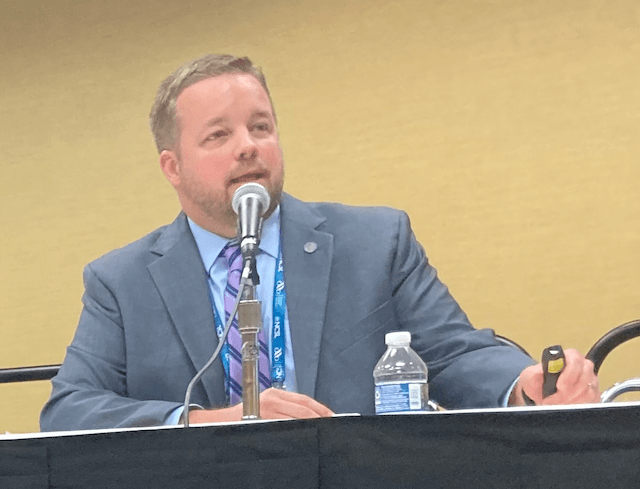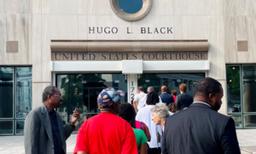Alabama Appeals to US Supreme Court in Battle Over Congressional District Map


Alabama lawmakers have appealed to the U.S. Supreme Court (SCOTUS) over the state's congressional redistricting fight.
This comes hours after a federal court struck down the latest map on Sept. 5, months after allegedly ignoring a similar court order requiring that the state lawmakers adhere to the Voting Rights Act (VRA).
Alabama Secretary of State Wes Allen immediately filed an appeal to the Supreme Court and a stay on the latest ruling until the state's case is heard.
"Notice is hereby given that Defendant Secretary of State Wes Allen hereby appeals to the Supreme Court of the United States from this Court’s September 5, 2023 Injunction, Opinion, and Order," court documents said.
However, SCOTUS is expected to strike down the map after it rejected a similar draft on June 8, which ruled that state lawmakers had allegedly racially gerrymandered districts in violation of the VRA.
State officials also filed an appeal to the 11th U.S. Circuit Court of Appeals as a precautionary measure.
In response to Alabama's appeal, President Joe Biden's Solicitor General Elizabeth Prelogar told the Supreme Court, “Voting in Alabama is intensely racially polarized, about as stark as anywhere in the country."
Alabama Republicans Lose Third Ruling Over Redistricting
A three-judge panel for the U.S. District Court for the Northern District of Alabama ruled that changes to the map were not sufficient.Judge Stanley Marcus, an appointee of President Bill Clinton and Judges Anna Manasco and Terry Moorer, who were both appointed by President Donald Trump, wrote the decision.
"But we have now said twice that this Voting Rights Act case is not close. And we are deeply troubled that the State enacted a map that the State readily admits does not provide the remedy we said federal law requires."
“We are disturbed by the evidence that the State delayed remedial proceedings but ultimately did not even nurture the ambition to provide the required remedy. And we are struck by the extraordinary circumstance we face.
“We are not aware of any other case in which a state legislature—faced with a federal court order declaring that its electoral plan unlawfully dilutes minority votes and requiring a plan that provides an additional opportunity district—responded with a plan that the state concedes does not provide that district."
"The law requires the creation of an additional district that affords Black Alabamians, like everyone else, a fair and reasonable opportunity to elect candidates of their choice. The 2023 Plan plainly fails to do so.”
The court rejected Alabama's argument that drawing a second black-majority district would unconstitutionally constitute “affirmative action in redistricting.”
“Unlike affirmative action in the admissions programs the Supreme Court analyzed in Harvard, which was expressly aimed at achieving balanced racial outcomes in the makeup of the universities’ student bodies, the Voting Rights Act guarantees only ‘equality of opportunity, not a guarantee of electoral success for minority-preferred candidates of whatever race,’” they added.
The court was referring to the June SCOTUS decision, Students for Fair Admissions Inc. v. President and Fellows of Harvard College, which struck down the use of racially discriminatory admissions policies at U.S. colleges.
“The Voting Rights Act does not provide a leg up for Black voters—it merely prevents them from being kept down with regard to what is arguably the most ‘fundamental political right,’ in that it is ‘preservative of all rights’—the right to vote,” the panel concluded.
The court also ordered that a special master and a cartographer would have to prepare and submit three new, statutorily compliant maps by Sept. 25.
Kavanaugh and Roberts Side With Democrats
In January 2022, the district court issued a preliminary injunction against Mr. Allen's predecessor, Alabama’s then-secretary of state, John Merrill, which temporarily forbade him from conducting any congressional elections in the state.Chief Justice John Roberts and Justice Brett Kavanaugh joined the three liberals on the court for the 5-4 decision.
Alabama legislators in July drew up a new map in response, while defenders of the map said that SCOTUS did not explicitly require proportionality or a second black-majority district.
Congressional District Map Fight Intensifies
State officials in Alabama said they now plan to have a new congressional map in time for the 2024 elections by Oct. 1, as the deadline allows enough time to "reassign voters, print and distribute ballots, and otherwise conduct the forthcoming 2024 primary elections based on the new map."Secretary of State Allen told The Epoch Times on Sept. 5, “I am aware of the Federal Court ruling issued today. While we wait for a final map, my office will continue to support local officials as we ensure that we are prepared to conduct safe, secure and fair elections in Alabama."
“I, along with my team, remain committed to ensuring our election laws are followed and every legal vote is counted.”
Although 27 percent of Alabama’s population is black, white voters are the majority in six of the state’s seven current congressional districts.
The creation of a second-majority black congressional district, is expected to flip one of the six Republican-held seats Democrat since black voters traditionally vote overwhelmingly for the latter.


No comments:
Post a Comment